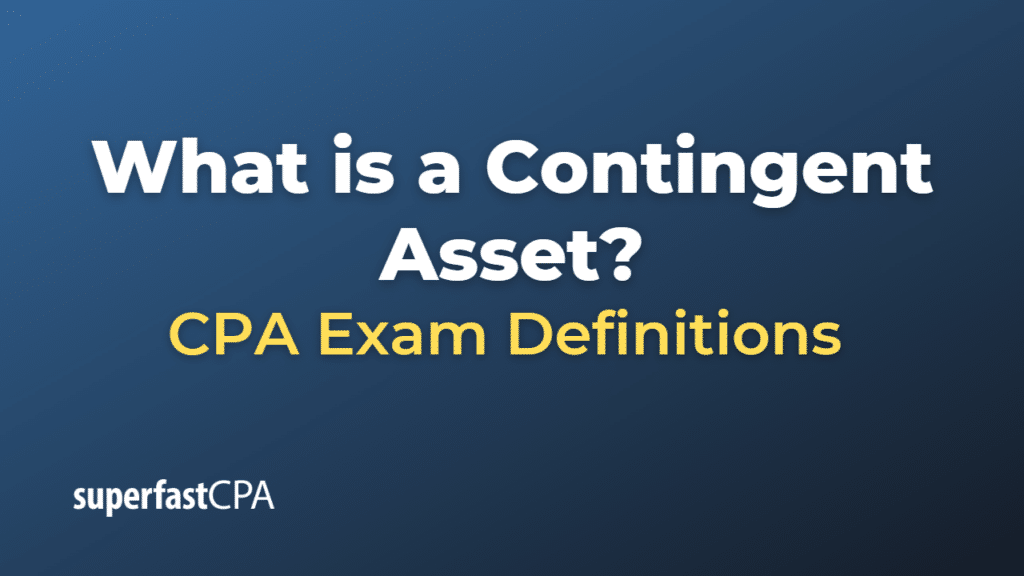Contingent Asset
A contingent asset is a potential asset that may arise from a past event or transaction, but its existence and value are dependent on the occurrence of uncertain future events that are beyond an organization’s control. Contingent assets are not recognized on the financial statements because their realization is not considered probable or the value cannot be reliably measured. However, if the related future event becomes more likely or the value can be reliably estimated, the contingent asset may be recognized in the financial statements.
Contingent assets can arise from various situations, such as:
- Legal claims or lawsuits: If a company has filed a lawsuit against another party and expects to receive a settlement or compensation, it may have a contingent asset. The asset’s realization depends on the outcome of the legal proceedings, which is uncertain and beyond the company’s control.
- Insurance claims: If a company has submitted an insurance claim for damages or losses but has not yet received a settlement, the potential settlement amount is a contingent asset. The asset’s realization is subject to the insurance company’s decision and the settlement process.
- Sales contracts with performance clauses: If a company has entered into a sales contract that includes performance-based incentives or bonuses, the potential additional revenue is a contingent asset. The realization of this asset depends on the company meeting the specified performance criteria.
- Potential sale of assets: If a company is negotiating the sale of an asset but has not yet reached a final agreement, the expected proceeds from the sale are a contingent asset. The asset’s realization depends on the successful completion of the negotiations and the execution of the sale agreement.
Although contingent assets are not recognized on the balance sheet, they may be disclosed in the notes to the financial statements if the likelihood of realization is considered more than remote. This disclosure provides additional information to users of the financial statements about potential resources or benefits that the company may receive in the future.
Example of a Contingent Asset
Let’s consider a technology company, TechCorp, which has developed a revolutionary new software product. Another company, RivalTech, is alleged to have infringed on TechCorp’s intellectual property rights related to this software. TechCorp has filed a lawsuit against RivalTech, seeking compensation for the infringement.
In this scenario, TechCorp has a contingent asset arising from the legal claim against RivalTech. The realization of this asset is uncertain and depends on the outcome of the legal proceedings, which are beyond TechCorp’s control.
At the time of preparing its financial statements, TechCorp assesses the likelihood of winning the lawsuit as follows:
- If TechCorp believes that it is probable (more likely than not) that it will win the lawsuit and can reliably estimate the compensation amount, it will recognize the compensation as an asset on its balance sheet.
- If the likelihood of winning the lawsuit is considered possible (but not probable) or the compensation amount cannot be reliably estimated, TechCorp will not recognize the compensation as an asset on its balance sheet. However, it may disclose the contingent asset in the notes to the financial statements, providing information about the nature of the claim, the possible range of compensation, and the expected timing of the legal proceedings.
- If the likelihood of winning the lawsuit is considered remote, TechCorp will neither recognize the compensation as an asset nor disclose it in the notes to the financial statements.
In this example, the contingent asset (the potential compensation from the lawsuit) is not recognized on TechCorp’s balance sheet due to the uncertainty surrounding the outcome of the legal proceedings. However, disclosing the contingent asset in the notes to the financial statements can provide valuable information to users about potential future benefits that the company may receive if it wins the lawsuit.













